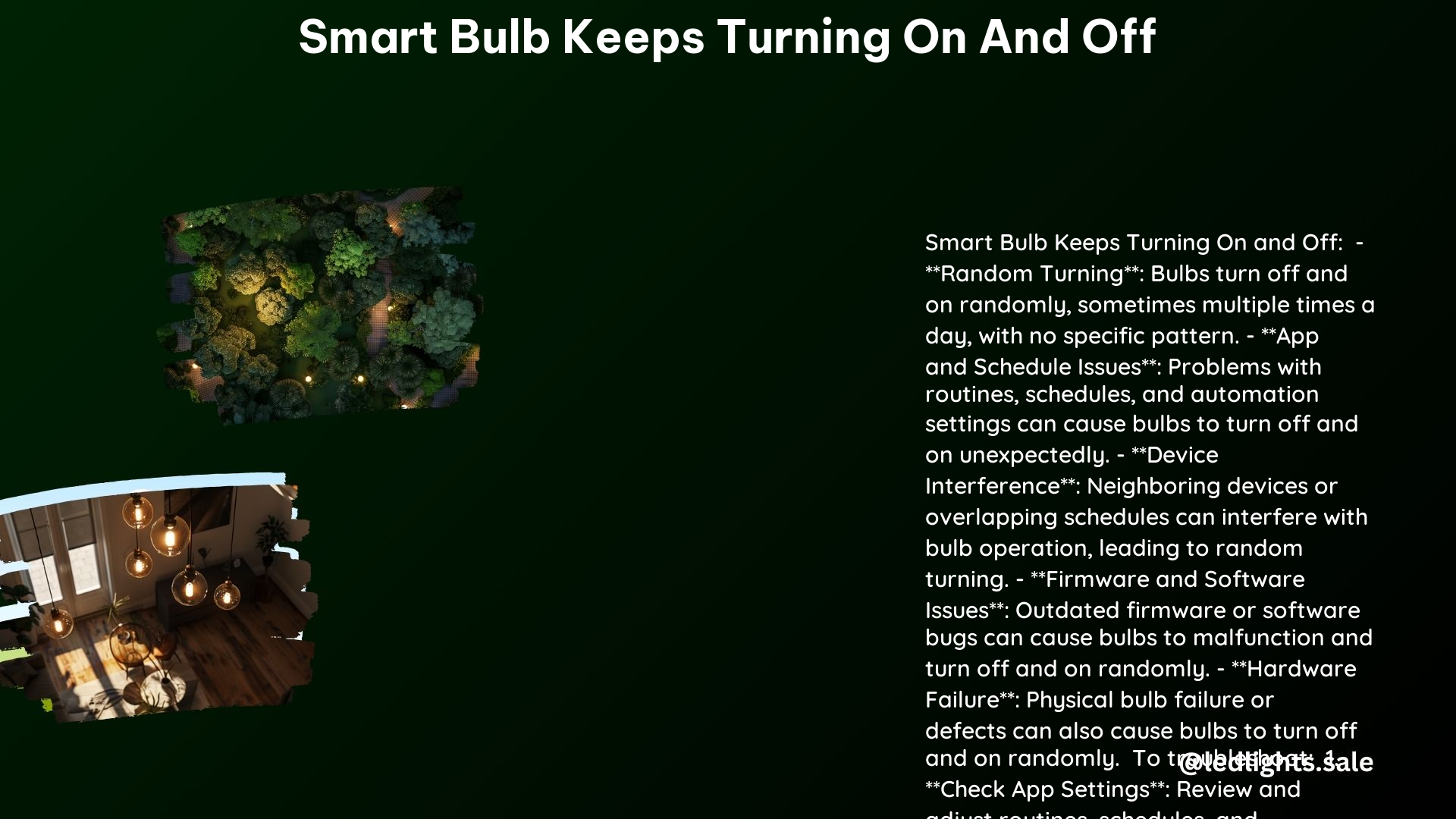The issue of a smart bulb turning on and off randomly can be frustrating and challenging to diagnose. This comprehensive guide will provide you with a deep dive into the possible causes and effective solutions to help you resolve the problem once and for all.
Firmware Issues
Outdated Firmware
One of the primary reasons for a smart bulb’s erratic behavior could be an outdated firmware. Manufacturers regularly release firmware updates to address bugs, improve performance, and add new features. Ensure that your smart bulb’s firmware is up-to-date by checking the manufacturer’s app or website for the latest version. Follow the instructions provided by the manufacturer to update the firmware correctly.
Firmware Bugs
Sometimes, specific firmware versions may contain bugs that can cause the smart bulb to malfunction, leading to the on-and-off issue. If you’ve already updated the firmware and the problem persists, look for any known firmware-related issues or solutions provided by the manufacturer. You may need to wait for the manufacturer to release a fix or consider reverting to a previous firmware version if that’s an option.
Schedule and Routine Conflicts

Overlapping Schedules
Smart bulbs often come with scheduling features that allow you to automate their behavior. However, if you have set up multiple overlapping schedules, it can cause the bulb to turn off unexpectedly. Review your schedules and disable any unnecessary or conflicting ones to see if that resolves the issue.
Alexa Routines
If you’re using Alexa-enabled smart devices, the issue may be related to Alexa’s hunches or routines. Alexa’s automated actions can sometimes interfere with the smart bulb’s behavior, leading to unexpected on-and-off cycles. Check and adjust your Alexa settings to prevent any unwanted actions that might be causing the problem.
Network and Connectivity Issues
WiFi Signal Strength
Smart bulbs rely on a stable WiFi connection to function correctly. If the WiFi signal strength is weak or intermittent, it can lead to connectivity issues and cause the bulb to turn on and off randomly. Ensure that the smart bulb is within the optimal range of your wireless router. Consider using a WiFi extender or mesh network system to improve the signal strength if necessary.
Interference from Other Devices
Other devices on the same network can potentially interfere with the smart bulb’s connection, resulting in the on-and-off behavior. Try isolating the smart bulb on a separate network or disabling other devices temporarily to identify the source of the interference.
Physical Installation and Hardware
Dimmer Switches
Smart bulbs may not work correctly with dimmer switches, as they are designed to operate with standard on/off switches. Ensure that the smart bulb is installed in a fixture with a standard on/off switch, and avoid using it with a dimmer switch.
Motion Sensors and Timers
If the smart bulb is connected to a motion sensor or timer, it may be causing the bulb to turn off unexpectedly. Disable these features or adjust their settings to see if that resolves the issue.
App and Account Issues
App Glitches
Occasionally, issues with the manufacturer’s app can lead to the smart bulb’s erratic behavior. Try reinstalling the app or resetting the bulb to see if that resolves the problem.
Account and Authentication
Ensure that the smart bulb is properly linked to the correct account and that the authentication process is working correctly. Any issues with the account or authentication can contribute to the on-and-off problem.
Technical Specifications
Smart Bulb Models
Various smart bulb models from different manufacturers, such as Ring, Google Nest, Philips Hue, and Gosund, have been reported to exhibit the on-and-off issue. The specific causes and solutions may vary depending on the bulb model and manufacturer.
Firmware Versions
Certain firmware versions of smart bulbs may be more prone to bugs or issues that can cause the bulb to malfunction. Check the manufacturer’s website or community forums for any known firmware-related problems and solutions.
Network Requirements
Smart bulbs typically require a stable WiFi connection with a minimum signal strength to function correctly. The recommended WiFi signal strength for most smart bulbs is -67 dBm or better. Anything below this threshold may result in connectivity issues and the on-and-off problem.
References
- Ring Community. (2023). Smart light bulb turns off. Retrieved from https://community.ring.com/conversations/smart-lighting/smart-light-bulb-turns-off/658044af51f6e6fe7884f095?lang=en
- Google Nest Community. (2023). Lights Randomly Turning Off and On. Retrieved from https://www.googlenestcommunity.com/t5/Apps-Account/Lights-Randomly-Turning-Off-and-On/m-p/374485
- Reddit. (2021). Lights turning off by themselves. Please help. Retrieved from https://www.reddit.com/r/Hue/comments/lysqnr/lights_turning_off_by_themselves_please_help/
- Amazon Forum UK. (2021). Smart bulb turning off and on. Retrieved from https://uk.amazonforum.com/s/question/0D54P000084i4daSAA/smart-bulb-turning-off-and-on
- TP-Link Community. (2020). Smart bulb suddenly turns on and off randomly after 2 years of working fine. Retrieved from https://community.tp-link.com/en/home/forum/topic/236580
